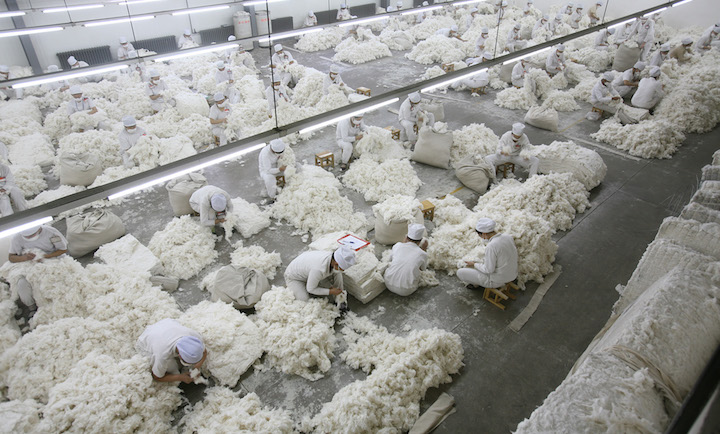The U.S. will bar entry of all cotton products and tomatoes from China’s Xinjiang region, where it says Beijing is oppressing Muslim-minority Uighurs.
The move is the latest in a series of actions where the U.S. is raising pressure on China over some companies’ alleged ill-treatment of workers. The U.S. says the Chinese government has detained more than 1 million Uighurs and other ethnic and religious minorities in “re-education” internment camps, allegations that the Foreign Ministry in Beijing denies.

The goods to be detained at U.S. ports of entry in the so-called withhold-release order, or WRO, following the CBP investigation include apparel, textiles, tomato seeds, canned tomatoes, and tomato sauce, Acting Customs and Border Protection Commissioner Mark Morgan said. The WRO will also apply to products manufactured in other countries that use cotton and tomatoes from Xinjiang, he said.
The action is a blow for the U.S. clothing industry, given that one-fifth of the world’s cotton comes from the region. The U.S. imported $9 billion of cotton products in the past year and $10 million of tomatoes from China, said Brenda Smith, the executive assistant commissioner in the office of trade at CBP.
China’s Foreign Ministry did not immediately reply to a request for comment on the fresh bans, but has previously accused U.S. politicians of “concocting disinformation of so-called forced labor in order to restrict and oppress relevant parties and enterprises in China as well as contain China’s development.”
In a statement, the American Apparel & Footwear Association, the National Retail Federation, Retail Industry Leaders Association and U.S. Fashion Industry Association asked the CBP to share the evidence and thresholds used to arrive at its findings. They also requested that the agency “share enforcement actions so that industry can further inform their due diligence and amplify and expand CBP’s enforcement efforts.”
The ban is “very significant,” AAFA President and CEO Steve Lamar said in an emailed response to questions. “All companies that use cotton in their supply chains need to take notice.” The association represents more than 590 firms.
In September, CBP said it planned WROs covering all cotton, textile and tomato products from the country’s northwestern Xinjiang region. CBP has already issued WROs against three Xinjiang-based hair-product and garment producers in 2020.
Xinjiang is China—and Asia’s—largest tomato production and processing region, generating about 70% of the country’s total shipments of the commodity. Tomatoes are also the largest export commodity for the region, with an annual value of more than $500 million. COFCO Tunhe, Chalkis Health Industry Co. and Xinjiang Tianye dominate the tomato industry in the region with a 60% market share.
China is the world’s top exporter of tomato paste, accounting for nearly 40% of the global trade, according to local media reports. Xinjiang exported more than 80% of its tomato paste to Russia and Italy in the first 8 months of 2019.
‘Genocide’
In December, the U.S.-based Center for Global Policy published a report alleging new evidence from Chinese government documents and media reports of hundreds of thousands of Uighurs in Xinjiang being forced to pick cotton by hand through coercive state-mandated labor.
President-elect Joe Biden has labeled China’s mass detention and re-education program for Xinjiang’s Uighur minority as “genocide” and called for an international effort to make a united stand against the campaign.
In addition to ensuring targeted enforcement, the incoming administration should consider a “whole-of-world” approach to align the U.S.’s allies on ending forced labor in Xinjiang, the AAFA’s Lamar said.
“It is important that this is be a coordinated effort to ensure that products made with forced labor are not sent into China for domestic consumption or used elsewhere in the world,” he said.










